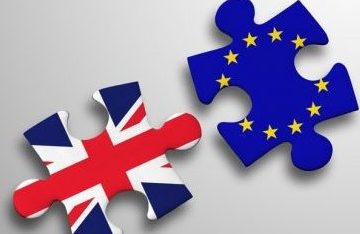
Can Facebook govern itself?
It has been a tough few years for Facebook. Following Cambridge Analytica and the Russian interference in the 2016 election to ‘Definers-gate’, Myanmar, and a host of other crises, it is clear that, as Mark Zuckerberg has even now stated, ‘regulation is coming.’ Competition authorities, privacy regulators, and electoral commissions are all now grappling with the influence of big tech, but in the meantime, Facebook has begun implementing a series of much-needed policy changes and self-regulatory tweaks. In particular, transparency has emerged as a key means through which Facebook has attempted to regain the trust of the public, politicians, and regulatory authorities. These efforts are clearly no substitute for effective regulation, but have had an immediate impact that is worth …

It’s not you, it’s us! What the Brexit divorce tells us about the EU’s own weaknesses
According to social media in Russia, “Brexit” has just assumed a new meaning: you say goodbye, but never leave. Vasilij Petrovich has drunk half a bottle of vodka, broken some precious porcelain, offended the hosts, and despite saying goodbye, he is still sitting at the table and drinking. You feel like pushing him out to the cold, but this would create more problems than keeping him in. This story reflects the current European dilemma. For many years, the United Kingdom enjoyed the benefits of European integration without trying to become a constructive, let alone affectionate, EU member. Two years ago, it decided to leave the EU, but is still pondering whether to leave through the door, window or chimney. The …

How did Voting on the Brexit Referendum Affect Voting on May’s Brexit Deal?
On January 15, 2019, Prime Minister Theresa May’s Brexit deal suffered a defeat of historic proportion in the House of Commons: 432 MPs voted against and 202 for the ‘EU Withdrawal Act’, with a staggering margin of 230 votes. But how do the MP positions on May’s deal compare with the constituency-level votes on the 2016 referendum? [i] Notably, almost all the intra-party variation in voting takes place on the Tories’ side of the aisle. Only 3 Labour MPs bucked the party line and voted for the deal, whereas 118 Tories voted against May’s proposal. The plot below shows the distribution of constituency vote on the Brexit referendum by MPs voting either for or against the Brexit deal. The graph …

Our Day Will Come: The Inevitability of Irish Unification as Brexit Approaches
On June 23rd, 2016, the citizens of the UK voted to leave the European Union. This began an unprecedented process of dissociation, commonly known as Brexit. Among the many challenges that Brexit poses is how to handle the border between Britain and the Republic of Ireland. In the recent past, the “soft” border between the two nations has allowed for the free flow of people and goods. However, if Brexit negotiations fail, a “hard” border will replace the currently soft border between the Republic and Northern Ireland. This presents a problem because under present conditions the border allows for mutually beneficial economic and social exchange, as well as having been instrumental in guaranteeing the Northern Irish peace process. This border …

Collateral Benefit: Brexit as Catalyst for European Structural Reform?
Brexit, if it has to happen, could have a silver lining. It could be an opportunity to reform and refashion the European project by making good on the aspiration of an ever-closer political union, needed today more than ever before. The Need for a Stronger Union President Macron addressing the need for EU reform with deeper political integration 26 September 2017 at the Sorbonne in Paris. Photograph: Ludovic Marin/Reuters Judging from my experience in the UN climate change negotiations, the EU can be a major international player and a force for good, but only if it ceases to ‘punch below its weight’ due to a lack of political union. This is why I fully concur with the view expressed by …

No New Cold War: Give Strategic Interdependence a Chance
With its concept of strategic autonomy, the EU risks triggering a new Cold War. In the context of globalisation and digitisation, it should focus on strategic interdependence instead. Annegret Bendiek provides a counterpoint to Paul Timmers on strategic autonomy and cybersecurity. Europe’s foreign and security policy framework has changed fundamentally since Donald Trump took office. With the US’s unilateral withdrawal from the Paris Climate Agreement, declaration that NATO was “obsolete”, unilateral recognition of Jerusalem as the capital of Israel, and termination of the nuclear agreement with Iran, the political atmosphere in EU-US talks has noticeably cooled when it comes to upholding multilateral agreements. Meanwhile cooperation on a technical level in counter-terrorism and cybersecurity is still vital. Punitive US tariffs on European …

Tracking the Twitter conversation on the Irish abortion referendum
In this article, we use TwitterTrails[i] to follow and analyse the online conversation about the contentious Irish abortion referendum. This referendum offers a useful opportunity for study because it is one of the first referendums in a Western democracy since 2016, when the phenomenon of misinformation on the Internet first gained prominence. Following the revelations of foreign social media interference during the 2016 U.S. presidential election, the Irish referendum was widely seen as a test for social media companies’ ability to protect voters from election meddling.[ii] Some social media companies, such as Facebook and Google, had taken action and previously introduced tools to improve transparency. Indeed, eventually, Facebook blocked political advertising from groups outside Ireland altogether. Google soon joined this …

Cybersecurity is forcing a rethink of strategic autonomy
Just a few days ago, European Commission President Jean-Claude Juncker presented his 2018 State of the Union speech with the title “The Hour of European Sovereignty”. In the speech, he argues that the time has come for the EU “to become more autonomous and live up to our global responsibilities”. The question is how to make this ambition become a reality, how to achieve strategic autonomy. Especially in the context of cybersecurity, strategic autonomy is becoming a widely discussed topic. The growing interest in the link between “digital” or “cyber” and strategic autonomy is driven by the increased dependency on transformative digital technologies throughout the economy and society, combined with the explosive growth of cyberthreats and incidents. The political context …









